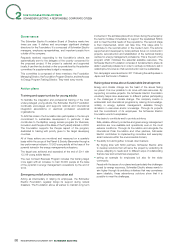APC 2011 Annual Report Download - page 81
Download and view the complete annual report
Please find page 81 of the 2011 APC annual report below. You can navigate through the pages in the report by either clicking on the pages listed below, or by using the keyword search tool below to find specific information within the annual report.
REGISTRATION DOCUMENT 2011 SCHNEIDER ELECTRIC 79
SUSTAINABLE DEVELOPMENT
2
COMMITTED TO AND ON BEHALF OFEMPLOYEES
Approach
Schneider Electric considers that freedom of association and
collective bargaining are fundamental rights and must be respected
everywhere. For many years, social dialogue has been taken into
consideration by our social reporting system: each year, local HR
report the presence of trade unions, works councils and health
& safety committees (see page 103 ). In 2011, 85% of Schneider
Electric entities have at least one representative organization (fi gure
based on more than 80% of the overall headcount).
Social dialogue is managed at European level through the European
Works Council and at Country level by the HR leaders. Schneider
Electric applies in all countries the same HR policies and processes
regarding career management, training, diversity, health & safety…
as well as the Responsibility and Ethics Dynamics program and the
R&ED line (under deployment, see pages57-58 ).
Action plans in major localisations
European Works Council (EWC)
Schneider Electric senior management and the employee
representatives of the European countries decided to set up the
Schneider Electric European Committee (renamed European
Works Council) under the terms of a collective agreement signed
on January28, 1998.
This European channel for dialogue has enabled the management
to make more effi cient decisions by giving employee representatives
the opportunity to be informed of such decisions and to understand
their reasons, as well as to put forward proposals to supplement or
improve them.
It has also fostered the emergence of a strong identity, combining
different cultures and having the common aim of working towards
social and economic progress within the companies in the Group
at European level.
Buoyed by this encouraging result, the signatory parties agreed
in 2011 to revise the existing agreement by pursuing the following
objectives:
•take into account recent acquisitions in Europe;
•incorporate the provisions of the European Directive 2009/38/EC
of 6May 2009, which supplements the Directive of 22September
1994 by specifying dialogue and consultation methods between
Management and employee representatives at European level.
This amendment clarifi es the role of the EWC and its Bureau in the
consultation process and re-defi nes the geographical scope of the
Committee offering one seat to Switzerland and Turkey.
The amendment number3 of the collective agreement has been
signed by all members of the EWC at end of 2011.
In 2011, the European Works Council met six times in three different
locations in Europe: fi ve restricted committees (including negotiation
meetings for the amendment) and one plenary session.
In March 2011, the members of the EWC received a two-day
training conducted by both external trainers and internal specialists.
The restricted committee, during its last session of the year,
reviewed two European agreements signed with the European
Metal Workers Federation:
•the European Agreement on the anticipation of changes signed
in 2007,
•the European Agreement on the integration of Areva D company
signed in 2010.
Also, the so-called “Temporary Instance”, to follow the integration
of the Areva D employees into Schneider Electric and gathering
representatives from both Alstom and Schneider Electric, held its
last meeting in May2011. Indeed, the participants considered that
this original body, created during the acquisition phase, reached the
objectives that the different parties agreed on in 2010.
Group Works Council, France
The Schneider Electric Group Works Council France is a forum
for economic, fi nancial and social dialogue between senior
management and the representatives of the employees from all
French subsidiaries. This body currently gathers 30 members.
In 2011, two sessions of training gathering all members have
beenorganised.
In order to better understand the evolution of the business of
Schneider Electric for the future, the Group Works Council France
visited a solar farm.
To discuss in depth important topics like the integration of Areva D
activities in Infrastructure Business unit, some additional meetings
have been organised during 2011. In total, the Committee had
three meetings of one or two days in 2011.
Social dialogue in the United States
In the United States, regular communication takes place with both
union and non-union employees on key business topics and trends
affecting their jobs. Company offi cials meet on a semi-annual basis
with key international union leaders to inform them of competitive
issues impacting the company’s business, and to ensure alignment
with the company’s business strategies and challenges, on a local,
regional and global basis.
In 2011, Schneider Electric successfully negotiated new collective
bargaining agreements with the three international unions in the
United States - the International Association of Machinists (IAM),
the International Brotherhood of Electrical Workers (IBEW) and the
International Brotherhood of Teamsters (IBT). A new three- year
labour agreement was ratifi ed at six manufacturing facilities
represented by the three unions. Also, a new three-year agreement
was ratifi ed by the employees represented by the Chicago and
4.8 Social Dialogue and relations
























